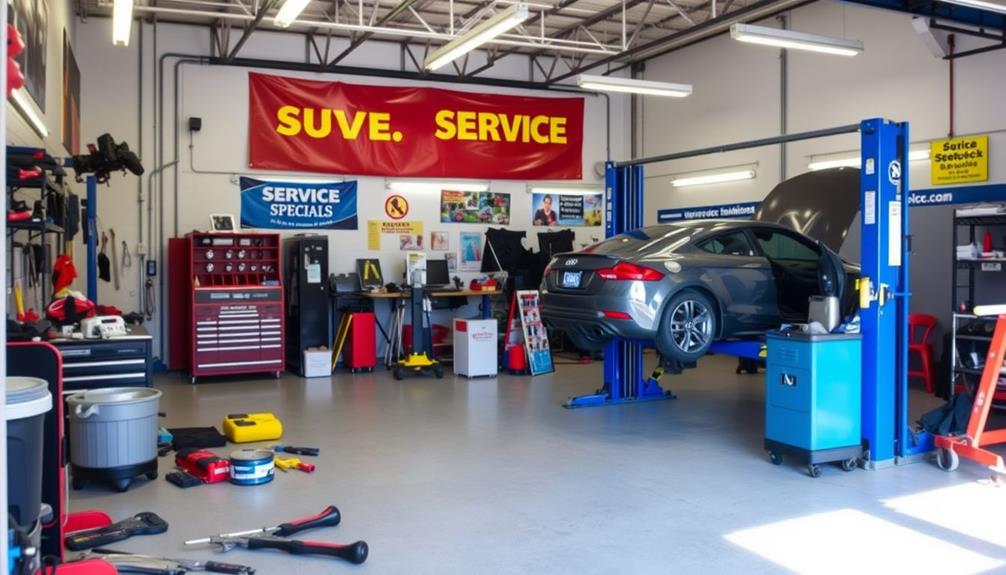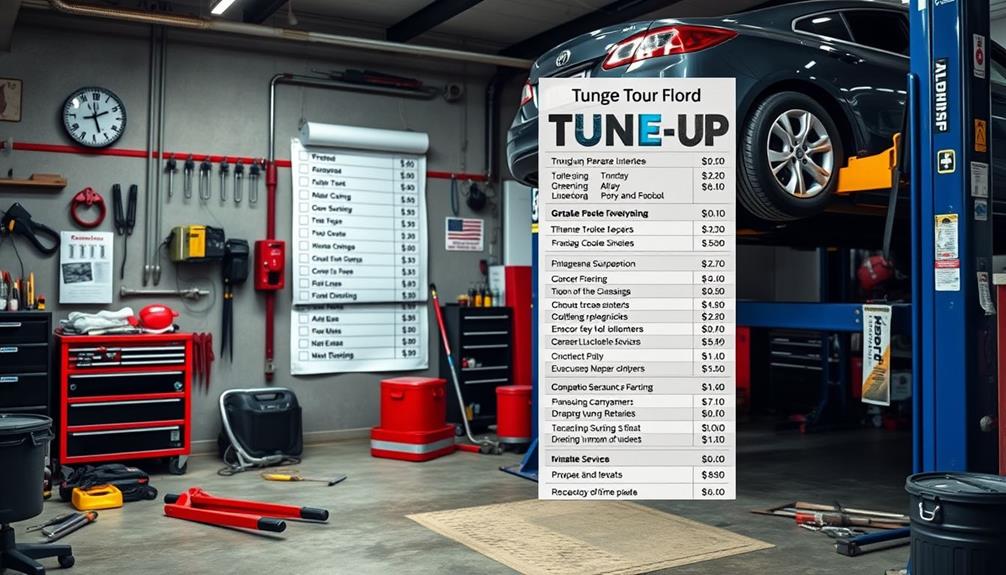To keep your vehicle healthy, you should schedule a tune-up every 30,000 to 45,000 miles. This regular maintenance optimizes performance, enhances fuel efficiency, and prevents costly repairs. If your car is newer, consider a tune-up every 6,000 miles, while cars between 5 to 10 years old should be checked every 5,000 to 7,500 miles. Older vehicles may need more frequent attention, around every 3,000 to 5,000 miles. Remember to check your owner's manual for specific recommendations. Knowing the signs that indicate a need for a tune-up can also keep your car running smoothly. You might discover more valuable insights ahead. Car tuneup frequency can vary depending on the make and model of your vehicle, as well as your driving habits. If you notice any changes in your car’s performance, such as decreased gas mileage, rough idling, or difficulty starting, it’s important to get a tune-up sooner rather than later. Staying on top of your car’s maintenance schedule will help extend its lifespan and keep it running at its best. By being proactive about tune-ups and regularly scheduled maintenance, you can avoid unexpected breakdowns and costly repairs down the road.
Key Takeaways
- Tune-ups are recommended every 6,000 miles for vehicles under 5 years, and every 3,000-5,000 miles for those over 10 years.
- Driving conditions, such as traffic and weather, can necessitate more frequent maintenance.
- Signs like reduced fuel mileage, strange noises, and warning lights indicate the need for a tune-up.
- Regular maintenance helps prevent costly repairs and enhances vehicle performance and safety.
- Following manufacturer recommendations ensures optimal vehicle health and can boost resale value.
Understanding Tune-Up Benefits
When it comes to vehicle maintenance, understanding the benefits of regular tune-ups can greatly enhance your driving experience.
Regular tune-ups are crucial for optimizing vehicle performance and guaranteeing fuel efficiency. By keeping your engine running smoothly, you not only enjoy a more responsive drive but also save on gas. Proactive maintenance through tune-ups helps catch potential issues early, preventing costly repairs that could arise from neglect.
Moreover, a well-maintained vehicle is safer to drive. Regular tune-ups guarantee critical components like brakes and steering are functioning properly, reducing the risk of accidents and promoting safe driving.
Following manufacturer recommendations for tune-up frequency isn't just a good idea; it can extend the overall health of your vehicle. This approach often leads to a more reliable and efficient driving experience.
Lastly, maintaining detailed service records through regular tune-ups can greatly boost your vehicle's resale value. When potential buyers see that you've taken care of your car, they're more likely to invest in it.
Factors Influencing Frequency

When it comes to tune-ups, your vehicle's age and mileage play a big role in how often you'll need maintenance.
If you've got an older car or one that's racked up over 30,000 miles, you might find yourself visiting the mechanic more frequently.
Plus, the driving conditions you face daily can also impact how often you need those tune-ups, so it's crucial to evaluate your unique situation.
Vehicle Age Impact
As vehicles rack up miles, their age plays an essential role in determining how often you should schedule tune-ups. For older vehicles, particularly those over 30,000-45,000 miles, you'll likely need more frequent tune-ups to address wear and tear on critical components. A proactive maintenance approach is important in this case to extend lifespan and enhance reliability.
Manufacturers often recommend tune-ups at different intervals based on age and mileage. If your vehicle is ten years or older, consider semi-annual tune-ups to guarantee peak performance and safety. Regular inspections can help you identify potential issues early, preventing costly repairs down the line.
Here's a quick overview of how vehicle age impacts your maintenance schedule:
| Vehicle Age | Recommended Tune-Up Frequency | Key Benefits |
|---|---|---|
| Under 5 years | Every 6,000 miles | Standard maintenance |
| 5-10 years | Every 5,000-7,500 miles | Early issue detection |
| 10+ years | Every 3,000-5,000 miles | Prolonged reliability |
| 30,000+ miles | Every 3,000-5,000 miles | Addressing wear and tear |
Driving Conditions Considerations
Vehicle age isn't the only factor influencing how often you should schedule tune-ups; driving conditions also play a significant role. If you frequently navigate stop-and-go traffic or harsh weather, your vehicle experiences increased strain, making regular maintenance essential.
Dusty or humid environments can lead to dirt and moisture causing engine issues, prompting you to evaluate more frequent tune-ups.
Aggressive driving habits, like rapid acceleration and hard braking, can accelerate wear and tear on your vehicle, further necessitating regular maintenance. For older vehicles or those surpassing 30,000-45,000 miles, you should expect to schedule tune-ups more often to address the impacts of aging components.
Always consult the manufacturer specifications outlined in your owner's manual to determine the best tune-up frequency for your specific make and model.
By being mindful of your driving conditions and habits, you can better maintain your vehicle's health and performance, ensuring it remains reliable for years to come.
General Frequency Guidelines

To keep your car running smoothly and safely, regular inspections are crucial. Most manufacturers recommend scheduling tune-ups every 30,000 to 45,000 miles, depending on your vehicle's make and model. This proactive maintenance not only guarantees peak performance but also enhances your safety on the road.
If you drive an older vehicle, you might need to take into account more frequent tune-ups—often every six months. This increased frequency is due to the wear and tear that older components experience over time.
Additionally, your driving conditions play a significant role in determining how often you should get a tune-up. If you frequently navigate stop-and-go traffic or endure extreme weather, you may need to schedule maintenance checks more regularly.
Recognizing Tune-Up Symptoms

Noticing changes in your car's performance can be the first step in recognizing when it needs a tune-up. One of the most telling tune-up symptoms is a notable drop in fuel mileage, which could indicate issues with engine operation or the emissions system.
Strange noises, like thumping or screeching, often signal underlying problems that should be checked out during a tune-up to prevent further damage.
Don't ignore warning lights on your dashboard, especially the check engine light. These lights often point to necessary maintenance, and ignoring them can lead to costly repairs down the line.
If you're having difficulty starting your engine, it might be a sign of spark plug issues—something usually addressed in a tune-up.
Lastly, pay attention to your braking capacity. If you notice a gradual decline in responsiveness or sudden shaking while braking, that's a critical sign that immediate maintenance is needed for your safety.
Recognizing these symptoms early can save you from more serious issues and keep your vehicle running smoothly.
Importance of Regular Maintenance

Regular maintenance is essential for keeping your car running smoothly and efficiently.
By staying on top of tune-ups, you can prevent costly repairs, enhance your vehicle's performance, and even extend its lifespan.
Investing in routine care not only saves you money in the long run but also gives you peace of mind on the road.
Prevent Costly Repairs
Maintaining your vehicle is essential for avoiding costly repairs down the road. Regular car maintenance, including tune-ups, helps you identify potential issues before they become expensive repairs. Routine inspections can uncover small problems, like worn spark plugs or low fluid levels, ultimately saving you 10-20% on repair costs over time.
Here's a quick overview of common maintenance tasks and their benefits:
| Maintenance Task | Benefits |
|---|---|
| Tune-ups | Prevents major breakdowns |
| Fluid checks | Maintains engine health |
| Tire rotations | Extends tire lifespan |
| Brake inspections | Guarantees safety and performance |
Neglecting routine maintenance can lead to significant declines in performance, resulting in repair bills that can soar into the thousands for neglected components. To prevent costly repairs, always follow the manufacturer's recommendations for tune-up frequency, typically every 30,000 to 45,000 miles. A well-maintained vehicle not only performs better but also retains a higher resale value, often selling for 15-20% more than those with irregular maintenance histories. Prioritize your vehicle's health today!
Enhance Vehicle Performance
A well-tuned engine is like the heartbeat of your vehicle, driving performance and efficiency. Regular maintenance, including tune-ups, plays a significant role in enhancing vehicle performance. By sticking to a schedule of oil changes and inspections, you guarantee that all engine components are clean and functioning properly.
This proactive approach prevents issues like clogged air filters and worn spark plugs, which can seriously impact your fuel economy. Additionally, maintaining a budget for regular vehicle upkeep can prevent financial strain from unexpected repairs, emphasizing the importance of creating a personal budget for vehicle maintenance.
When you follow the manufacturer's recommended maintenance schedule outlined in your owner's manual, you keep your vehicle operating at peak levels. Tune-ups help maintain smooth operation and increased power, giving you a more enjoyable driving experience.
Ignoring these essential checks can lead to performance dips, wasted fuel, and costly repairs down the line.
Incorporating regular maintenance into your routine isn't just about preventing problems; it's about enhancing your vehicle's overall performance. By addressing minor issues before they escalate, you'll enjoy better fuel economy and a more reliable ride.
Extend Vehicle Lifespan
Keeping up with vehicle maintenance not only boosts performance but also plays an essential role in extending your vehicle's lifespan. Regular tune-ups every six months can prevent major breakdowns and save you from costly repairs. By adhering to the manufacturer's recommended maintenance schedule, you can identify potential issues early, ensuring your vehicle remains in top condition for years to come.
| Maintenance Activity | Benefit |
|---|---|
| Regular Tune-Ups | Enhances vehicle performance |
| Thorough Inspections | Prolongs operational lifespan |
| Early Problem Identification | Reduces risk of major repairs |
Proactive maintenance, like consistent tune-ups, optimizes vehicle efficiency and longevity. Vehicles that receive regular maintenance experience fewer issues, leading to a longer operational lifespan compared to neglected ones. You'll not only keep your car running smoothly, but you'll also enjoy a more reliable ride. Investing in regular maintenance is a commitment that pays off, ensuring your vehicle serves you well throughout its life.
Current Service Specials and Offers

When it comes to vehicle maintenance, taking advantage of current service specials and offers can save you both time and money. For instance, if you need an oil change, you can benefit from special rates that cover up to 5 quarts of oil, valid until December 31, 2024. This is a great way to promote regular engine maintenance and keep your vehicle running smoothly.
Additionally, consider the Toyota Service Care prepaid maintenance plan, which provides two years of regular vehicle upkeep, including roadside assistance. This plan alleviates the hassle of unexpected car repair costs.
If you're looking to enhance your vehicle's performance, you can take advantage of discounts on air filters. You'll receive 10% off when purchasing both a cabin air filter and an air filter for your Toyota model.
Moreover, you can enjoy 15% off replacing both front Sightline wiper blade assemblies, ensuring clear visibility during adverse weather.
Frequently Asked Questions
How Often Should You Get Your Car Tuned Up?
You should get your car tuned up every 30,000 to 45,000 miles, but if you frequently drive in harsh conditions, consider more regular checks. Always consult your owner's manual for specific recommendations tailored to your vehicle.
How Can You Tell if Your Car Needs a Tune-Up?
You can tell your car needs a tune-up by noticing a drop in fuel mileage, unfamiliar noises, difficulty starting, warning lights on the dashboard, or a decline in braking performance. Don't ignore these signs!
What Is the Average Cost of a Full Tune-Up?
A full tune-up typically costs between $50 and $200, depending on your vehicle's needs. By investing in regular maintenance, you'll avoid hefty repair bills later—your car will thank you with smooth rides and longevity.
Are Car Tune Ups Worth It?
Absolutely, car tune-ups are worth it. They boost performance, enhance fuel efficiency, and prevent costly repairs. By catching minor issues early, you save money in the long run and keep your vehicle running smoothly.
Conclusion
In the fast-paced world we live in, neglecting your car's tune-up can lead to costly repairs and headaches down the road. On the flip side, regular tune-ups keep your vehicle running smoothly and efficiently, saving you time and money in the long run. By recognizing the signs and staying proactive, you're not just maintaining a car; you're investing in peace of mind. So, don't wait for a breakdown—embrace the benefits of regular maintenance and keep your ride healthy!









